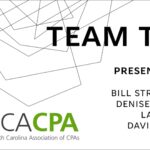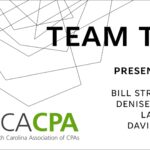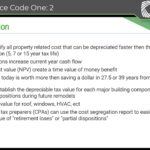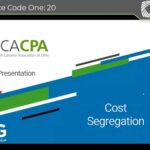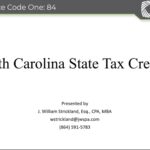Part 2 of 2: A comprehensive 2024 Income Tax update, multiple topics, multiple speakers. Be incredibly prepared for tax season. Discussion Leader: Various
Team Tax- Part One (LITX18/25)
Part 1 of 2: A comprehensive 2024 Income Tax update, multiple topics, multiple speakers. Be incredibly prepared for tax season. Discussion Leader: Various
SC and GA Tax Credits (LITX50/25)
Discover valuable tax-saving opportunities with Specialty Tax Group’s 1-hour CPE course on South Carolina/Georgia Tax Credits and R&D Tax Incentives. Led by tax expert Brian Wages, this course will provide a detailed overview of state-specific credits and strategies to maximize R&D tax benefits for businesses. Ideal for CPAs and financial professionals, this session will equip you with the tools to enhance your clients’ tax planning and savings. Discussion Leader: Brian Wages
Cost Segregation, GA and SC Tax, R&D Credit (LITX49/25)
Join Specialty Tax Group for a 1-hour CPE course on Cost Segregation, led by industry expert John Hanning. This course will demystify the process of cost segregation and demonstrate how it can accelerate depreciation, maximize tax savings, and improve cash flow for property owners. Perfect for CPAs and financial professionals, you’ll gain actionable insights to bring added value to your clients. Discussion Leaders: Brian Wages and John Hanning
Cost Segregation (LITX48/25)
Join Specialty Tax Group for a 1-hour CPE course on Cost Segregation, led by industry expert John Hanning. This course will demystify the process of cost segregation and demonstrate how it can accelerate depreciation, maximize tax savings, and improve cash flow for property owners. Perfect for CPAs and financial professionals, you’ll gain actionable insights to bring added value to your clients. Discussion Leader: John Hanning
R&D Tax Credits (LITX42/25)
This topic will cover the fundamentals of the Research and Development (R&D) Tax Credit. Our experts will go over the history and recent developments, project qualifications, calculating the benefits, the chronology of a typical project and common issues. Discussion Leader: Jessica Bowen
Tangible Property Repair Regulations (LITX41/25)
The Final Tangible Property Repair Regulations are in full effect, yet many taxpayers are not in compliance or are missing opportunities to take full advantage of these new rules. This session covers compliance requirements as well as potential tax planning strategies on both a retroactive and prospective basis. Our presenter will also go over in-depth examples and real-life case studies. Participants will be better able to identify tax saving opportunities and be in compliance with these new regulations. Discussion Leader: Amar Patel
Interaction Between Cost Segregations and 1031 Exchanges (LITX40/25)
Cost segregation and Tax Deferred Exchanges of Real Estate under IRC 1031 are two of the most valuable tax planning concepts that a real estate owner can utilize today. This presentation will provide insights on how a taxpayer can utilize both effectively and maximize their tax deferrals. We will also go over in-depth examples and case studies. Discussion Leader: Amar Patel
South Carolina Tax Update (LITX10/25)
What changes have the legislature, Department of Revenue and the courts brought to us South Carolina? Discussion Leader: Bill Strickland
SC State Tax Credits (LITX11/25, LITX17/25)
Are you leaving money on the table and not claiming all the South Carolina tax credits your clients are entitled to? Discussion Leader: Bill Strickland

